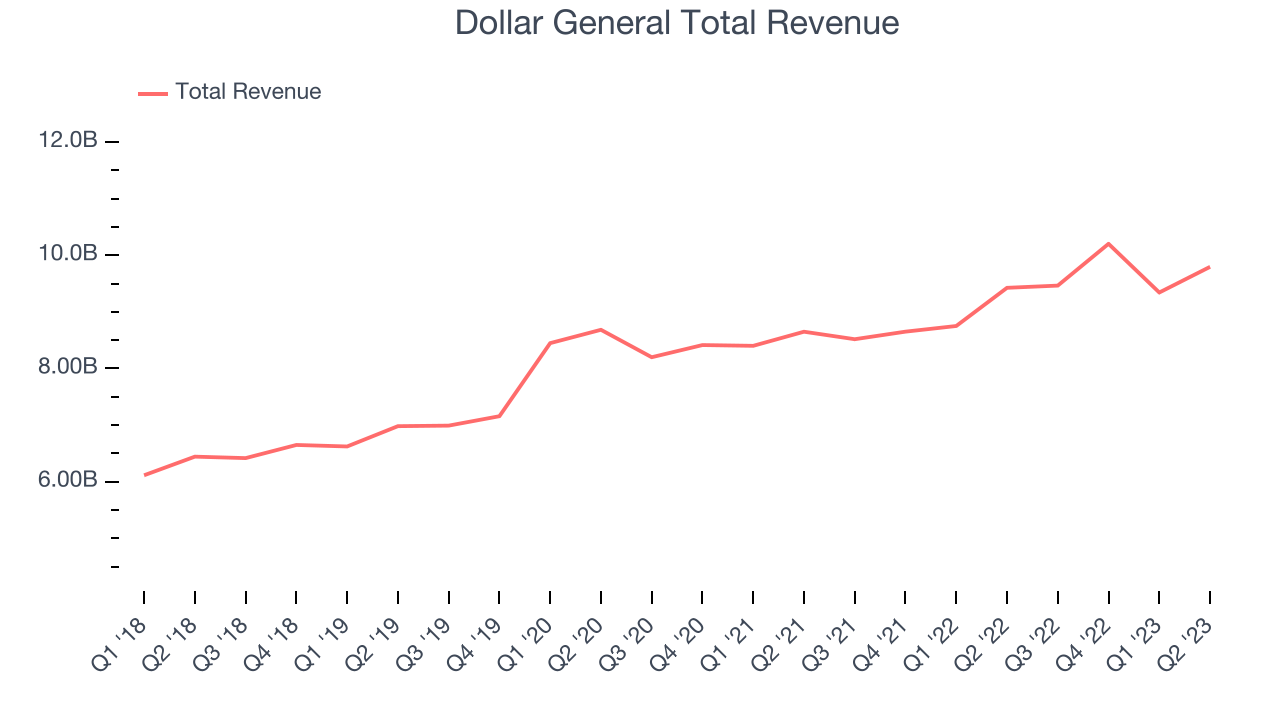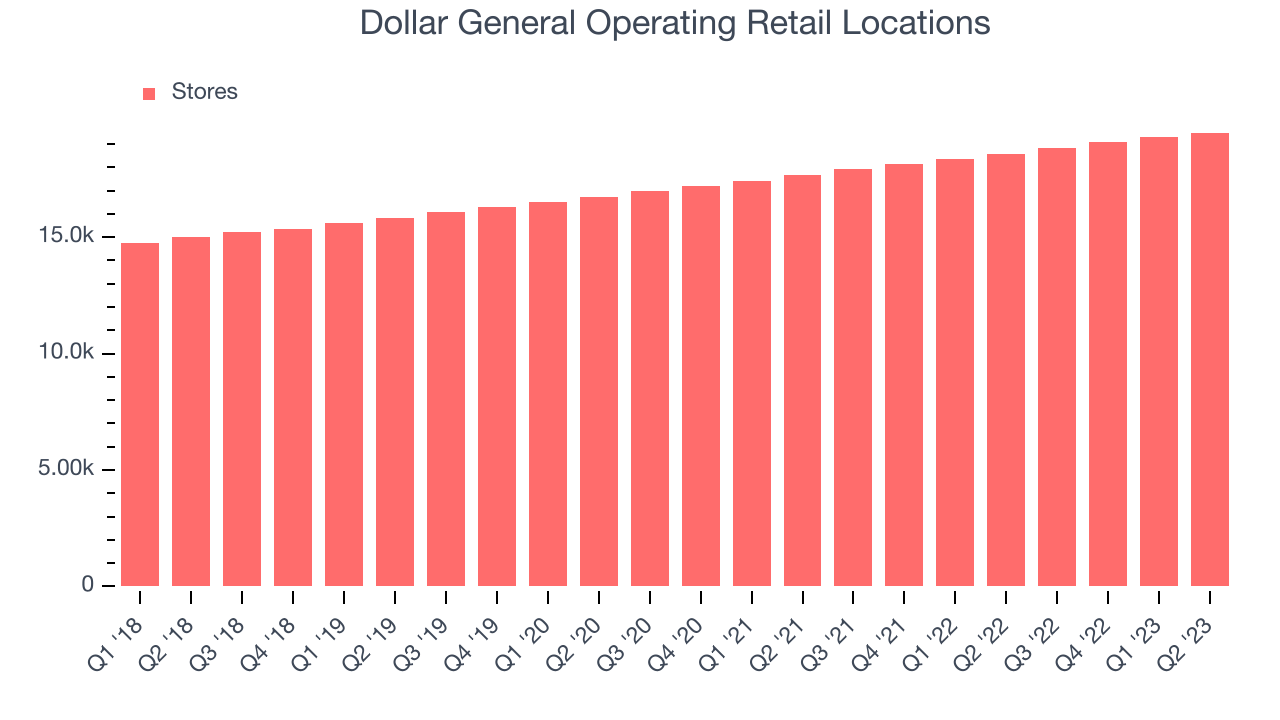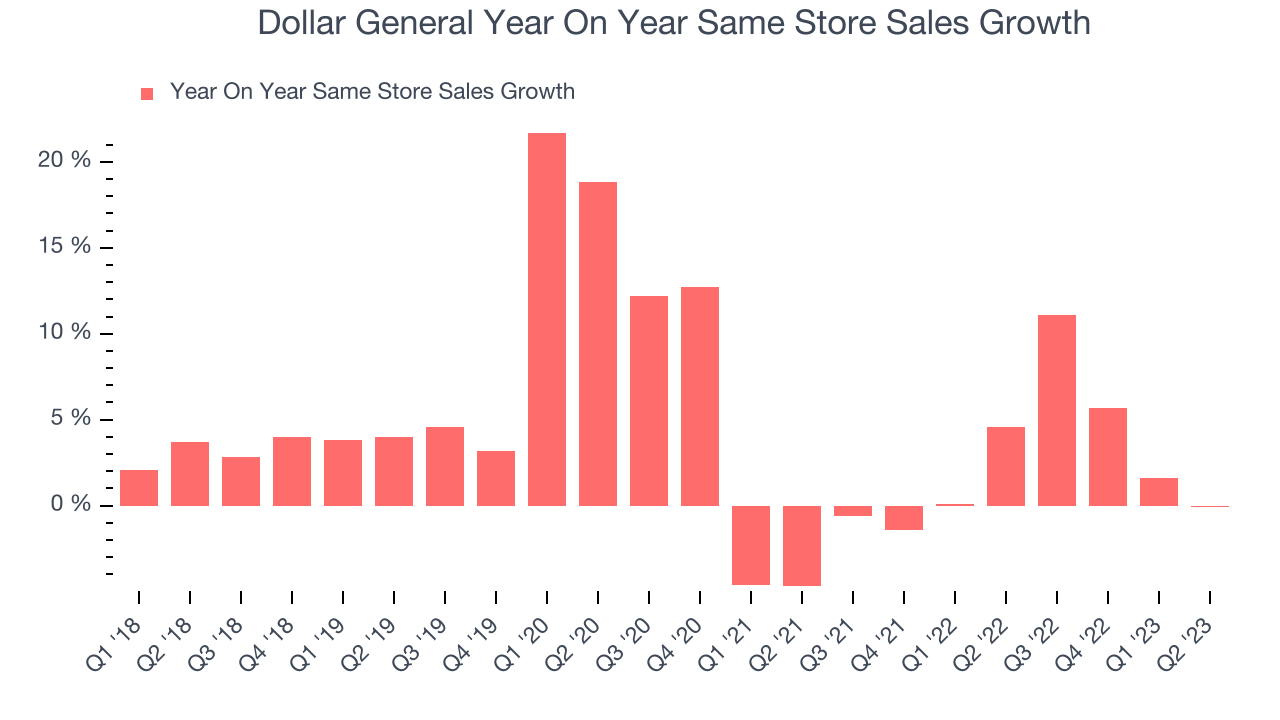Discount retailer Dollar General (NYSE:DG) missed analysts' expectations in Q2 FY2023, with revenue up 3.93% year on year to $9.8 billion. The company didn’t provide any forward revenue guidance. Turning to EPS, Dollar General made a GAAP profit of $2.13 per share, down from its profit of $2.98 per share in the same quarter last year.
Is now the time to buy Dollar General? Find out by accessing our full research report, it's free.
Dollar General (DG) Q2 FY2023 Highlights:
- Revenue: $9.8 billion vs analyst estimates of $9.91 billion (1.15% miss)
- EPS: $2.13 vs analyst expectations of $2.47 (13.7% miss)
- Free Cash Flow of $130.8 million, similar to the same quarter last year
- Gross Margin (GAAP): 31.1%, down from 32.3% in the same quarter last year
- Same-Store Sales were down 0.1% year on year (miss vs. expectations of up 0.7% year on year)
- Store Locations: 19,488 at quarter end, increasing by 922 over the last 12 months
“While we are not satisfied with our overall financial results, we made significant progress in the second quarter improving execution in our supply chain and our stores, as well as reducing our inventory growth rate and further strengthening our price position,” said Jeff Owen, Dollar General’s chief executive officer.
Appealing to the budget-conscious consumer, Dollar General (NYSE:DG) is a discount retailer that sells a wide range of household essentials, groceries, apparel/beauty products, and seasonal merchandise.
Traditional grocery stores are go-tos for many families, but discount grocers serve those who may not have a traditional grocery store nearby or who may have different spending thresholds. Certain rural or lower-income areas simply don’t have a grocery store. Additionally, some lower-income families would prefer to buy in smaller quantities than available at most stores (think one or two paper towel rolls at a time). While online competition threatens all of retail, grocery is one of the least penetrated because of the nature of buying food. Furthermore, those buying small quantities for immediate need are even less likely to leverage e-commerce for these purposes.
Sales Growth
Dollar General is one of the larger companies in the consumer retail industry and benefits from economies of scale, enabling it to gain more leverage on fixed costs and offer consumers lower prices.
As you can see below, the company's annualized revenue growth rate of 9.83% over the last four years (we compare to 2019 to normalize for COVID-19 impacts) was decent as it opened new stores and grew sales at existing, established stores.

This quarter, Dollar General grew its revenue by 3.93% year on year, falling short of Wall Street's estimates. Looking ahead, the analysts covering the company expect sales to grow 4.64% over the next 12 months.
The pandemic fundamentally changed several consumer habits. There is a founder-led company that is massively benefiting from this shift. The business has grown astonishingly fast, with 40%+ free cash flow margins. Its fundamentals are undoubtedly best-in-class. Still, the total addressable market is so big that the company has room to grow many times in size. You can find it on our platform for free.
Number of Stores
When a retailer like Dollar General is opening new stores, it usually means that demand is greater than supply, and in turn, it's investing for growth. Dollar General's store count increased by 922 locations, or 4.97%, over the last 12 months to 19,488 total retail locations in the most recently reported quarter.

Taking a step back, the company has opened new stores quickly over the last eight quarters, averaging 5.24% annual growth in new locations. This store growth outpaces the broader consumer retail sector. With an expanding store base and demand, revenue growth can come from multiple vectors: sales from new stores, sales from e-commerce, or increased foot traffic and higher sales per customer at existing stores.
Same-Store Sales
A company's same-store sales growth shows the year-on-year change in sales for its brick-and-mortar stores that have been open for at least a year, give or take, and e-commerce platform. This is a key performance indicator for retailers because it measures organic growth and demand.
Dollar General's demand within its existing stores has generally risen over the last two years but lagged behind the broader consumer retail sector. On average, the company's same-store sales have grown by 2.62% year on year. With positive same-store sales growth amid an increasing physical footprint of stores, Dollar General is reaching more customers and growing sales.

In the latest quarter, Dollar General's same-store sales fell 0.1% year on year. This decline was a reversal from the 4.6% year-on-year increase it posted 12 months ago. A one quarter hiccup isn't material for the long-term prospects of a business, but we'll keep a close eye on the company.
Key Takeaways from Dollar General's Q2 Results
With a market capitalization of $34.6 billion, a $353 million cash balance, and positive free cash flow over the last 12 months, we're confident that Dollar General has the resources needed to pursue a high-growth business strategy.
We struggled to find many strong positives in these results. Both its revenue and EPS unfortunately missed analysts' expectations. Gross and operating margins declined year on year. Additionally, the company lowered full year guidance across the board, with a particularly jarring reduction in EPS outlook. Management acknowledged this, saying “While we are not satisfied with our overall financial results, we made significant progress in the second quarter improving execution in our supply chain and our stores, as well as reducing our inventory growth rate and further strengthening our price position." Overall, this was a mediocre quarter for Dollar General. The company is down 14.4% on the results and currently trades at $135.06 per share.
So should you invest in Dollar General right now? When making that decision, it's important to consider its valuation, business qualities, as well as what has happened in the latest quarter. We cover that in our actionable full research report which you can read here, it's free.
One way to find opportunities in the market is to watch for generational shifts in the economy. Almost every company is slowly finding itself becoming a technology company and facing cybersecurity risks and as a result, the demand for cloud-native cybersecurity is skyrocketing. This company is leading a massive technological shift in the industry and with revenue growth of 50% year on year and best-in-class SaaS metrics it should definitely be on your radar.
The author has no position in any of the stocks mentioned in this report.
